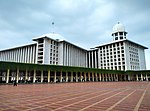Islam in Central Sulawesi

Islam in Central Sulawesi, a province of Indonesia, is the majority religion embraced by around 75%[1] of the province's 2,683,722 inhabitants (2011 projection figure, based on the 2010 census).[2] The propagators of Islam were thought to enter Central Sulawesi through neighboring regions, namely Bone, Wajo, and Mandar from the south and west routes, and through Gorontalo and Ternate from the north and east routes via Tomini Bay and Tolo Bay.
History[edit]
The Islamic teachings were thought to have first spread to the region of Central Sulawesi in Buol dan Banggai, where both regions accepted Islam in the mid-16th century due to influences from Ternate. A king of Buol was noted to have an Islamic name, namely Eato Muhammad Tahir who ruled between 1540-1595.[3]
At the beginning of the 17th century, Islam began to spread in the land of the Kailis propagated by Dato Karama (his real name Abdullah Raqie), who was believed to have come from Minangkabau.[4][5] Dato Karama preached in the Palu area and its surroundings, and because of him the Kaili king named Pue Njidi converted to Islam. In the Parigi and surrounding areas, another Minangkabau preacher named Dato Mangaji (also called by the local title Tori Agama)[6][7] was able to invite the Parigi king named Tori Kota and his son Magau Janggo to convert to Islam.[8]
Education[edit]
There is an Islamic institute of higher education established in Central Sulawesi, the STAIN Datokarama Palu.[9]
References[edit]
- ^ Persentase Pemeluk Agama menurut Kabupaten/Kota, 2007-2011 Archived 2015-06-10 at the Wayback Machine, Badan Pusat Statistik Provinsi Sulawesi Tengah. Retrieved 15 November 2013.
- ^ Jumlah dan Laju Pertumbuhan Penduduk, 1971,1980, 1990, 2000, 2005, 2010, dan 2011 Archived 2012-11-23 at the Wayback Machine, Badan Pusat Statistik Provinsi Sulawesi Tengah. Retrieved 15 November 2013.
- ^ Proyek Inventarisasi dan Dokumentasi Kebudayaan Daerah (Indonesia) (1981). Sejarah Pendidikan Daerah Sulawesi Tengah. Departemen Pendidikan dan Kebudayaan, Direktorat Sejarah dan Nilai Tradisional. p. 31.
- ^ Jurusan Antropologi, Fakultas Ilmu Social dan Ilmu Politik (1989). Antropologi Indonesia, Volume 16, Issue 47. Universitas Indonesia. p. 137.
- ^ Proyek Penelitian dan Pencatatan Kebudayaan Daerah (1977). Adat Istiadat Daerah Sulawesi Tengah. Departemen Pendidikan dan Kebudayaan Indonesia. pp. 19–21.
- ^ Situs Disporabudpar Kab. Parigi Moutong. "Makam Rangga Dunia/Tori Agama". Copyright © 2013. Archived from the original on June 27, 2013. Retrieved 26 June 2013.
- ^ Mattulada, dkk, ed. (1990). Sawerigading: Folktale Sulawesi. Departemen Pendidikan dan Kebudayaan, Direktorat Jenderal Kebudayaan, Direktorat Sejarah dan Nilai Tradisional, Proyek Penelitian dan Pengkajian Kebudayaan Nusantara. p. 456. Retrieved 26 June 2013.
- ^ Sejarah Daerah Sulawesi Tengah. Departemen Pendidikan dan Kebudayaan, Proyek Penerbitan Buku Bacaan dan Sastra Indonesia dan Daerah. 1979. p. 79. Retrieved 26 June 2013.
- ^ "Website resmi Sekolah Tinggi Agama Islam Negeri (STAIN) Datokarama Palu". Retrieved 15 November 2013.


 French
French Deutsch
Deutsch